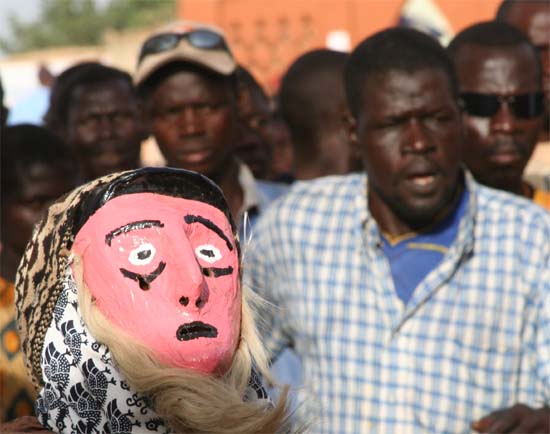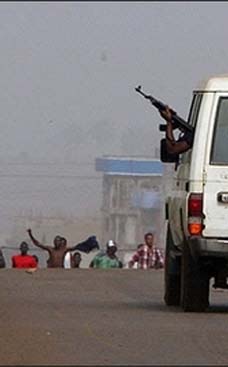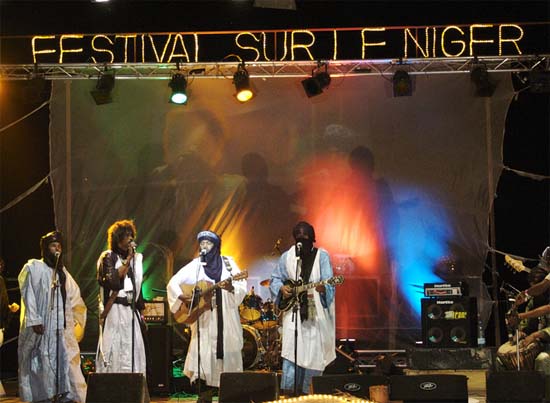
Does the Peace Corps really help in West Africa? I asked the cultural instructor, Sylvain Dabou. "A lot," he said. "They are educating the people about good health practices, and little by little they are making progress." (They have campaigned with some success, for instance, against clitoral excision, still widely practiced in West Africa.) The volunteers represent the best aspects of the American people, Dabou said. "They are not fighting Islam. They are helping us."
The Americans were half delighted to be in Segou, where Mali's most famous musicians played on the riverfront stage, and half sad at having left the villages where most had spent most of two years. When we talked to them, they didn't know whether they would be allowed back to Guinea or not: "I just want to finish my project and say goodbye to my friends," said Devon Brooks, a volunteer from New Jersey. Having seen Mali's villages, I tried to imagine what it would be like to have the Peace Corps drop you off in one of them and leave you there, alone, to work for two years. Orr lived in a village of "three mosques and one water pump" and a school with second, third and fifth grades. Like others I spoke to, he was a health educator, teaching villagers to wash their hands (with soap), eat nutritious foods and brush their teeth. He had felt lonely at times, but the villagers were "very nice people."
Volunteers spoke lovingly of their work in Guinea. One had been assigned to an area that supported the beleaguered president, so she had not been in any danger; another in their group had had "frightening experiences," she said. Both of them hoped to go back. Talking to the girls over lunch, I couldn't help feeling emotional. I told them how difficult it had been as an American to see our country's reputation tarnished the world over - diminished by our government's go-it-alone attitude and ill-advised war in Iraq. I told them how heartening it was to see Americans doing what they were doing - showing that most of our countrymen have kind hearts, high ideals and good intentions and are trying to do good in the world. "Thank you," I said. "You've done a lot to restore my faith." Then I left them, afraid I might burst into tears.
Beth Ashley writes: Earlier this month I spent four days at the Festival on the Niger in Mali where I met some of the Peace Corps Volunteers who had recently been evacuated because of political unrest in Guinea
Beth Ashley: Trip to Africa revives hope in improving America's image
Beth Ashley
Article Launched: 02/23/2007 04:05:43 PM PST
Caption: Festival sur le Niger 2007, Segou, Mali All Photos: Damian Rafferty Flickr Creative Commons Attribution-NonCommercial-ShareAlike 2.0
EARLIER THIS month, my friend Carol and I visited two countries in West Africa. We spent four days at the Festival on the Niger in Mali, where we saw African art, heard African music and watched splashy canoe races among teams from African villages.
On the third day of the festival, I reconnected to positive feelings about my own country that had recently slipped away.
The Malian city of Segou was transformed by the festival, attended by people from all over Africa. A man we met had been on a bus for 38 hours, coming from Ghana. The scene was dazzling: pavilions showed Bogolon fabrics, paintings and African sculpture, and in the open spaces between we watched performances by masked dancers and giant-faced puppets on stilts. A tribe of armed hunters marched to the beat of drums.
As wondrous as anything were the visiting crowds. The men wore flowing robes and bright Muslim caps; the women wore wraparound gowns in throbbing, multicolored fabrics, their heads swathed in matching turbans, saucily tied.
Everyone smiled. Everyone wanted to shake our hands. We wove through the crowds, murmuring, "No, thank you" to pursuing vendors who offered everything from phone cards to Dogon hats to intricate Taureg jewelry.
Segou was our first stop after an overnight in the country's capital, Bamako. Our route to Segou sped past goat herds and dusty villages whose inhabitants sat hopefully at roadside, selling everything from mangoes to car tires to bottles of petrol. At first sight, the villages, primitive and dreary, seemed like postcards of native life - until I realized they were the sum and substance of habitation in this part of Africa.
Segou was the same but more crowded, although here and there were a few showy roundabouts, patriotic statues and a riverside lined with rotting mansions left over from the days of French colonization. We took a trip upriver in a motorized pirogue to visit the old village where the present city was founded. A tribal chief greeted us, pocketing 2,000 Malian francs for his trouble. In the village we watched a woman shape perfect clay pots out of mud and grass she had mixed with her feet.
But most of our time in Segou was spent at the festival, marveling at how far we had come from Marin.
At one point, in the makeshift (and shaky) grandstands, I sat next to a white youth wearing eyeglasses and a Stars and Stripes patch on his rough cotton shirt. His name was Drew Orr and he was a Peace Corps volunteer from Indianapolis.
Next to me on the other side was a Taureg youth who identified himself as a cross-cultural instructor, working with 88 Peace Corps members who, like Orr, had just crossed the border from Guinea.
The 88, it turned out, had been evacuated because of political unrest in Guinea, where union-led opposition was protesting the rule of its long-entrenched president, Lansana Conte, who refused to step down.
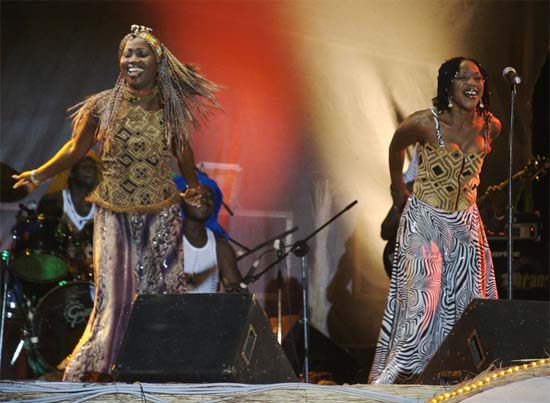
The Americans were half delighted to be in Segou, where Mali's most famous musicians played on the riverfront stage, and half sad at having left the villages where most had spent most of two years. When we talked to them, they didn't know whether they would be allowed back to Guinea or not: "I just want to finish my project and say goodbye to my friends," said Devon Brooks, a volunteer from New Jersey.
Having seen Mali's villages, I tried to imagine what it would be like to have the Peace Corps drop you off in one of them and leave you there, alone, to work for two years. Orr lived in a village of "three mosques and one water pump" and a school with second, third and fifth grades. Like others I spoke to, he was a health educator, teaching villagers to wash their hands (with soap), eat nutritious foods and brush their teeth. He had felt lonely at times, but the villagers were "very nice people."
He smiled at any hint of complaint: "I could be in Iraq."
Does the Peace Corps really help in West Africa? I asked the cultural instructor, Sylvain Dabou.
"A lot," he said. "They are educating the people about good health practices, and little by little they are making progress." (They have campaigned with some success, for instance, against clitoral excision, still widely practiced in West Africa.) The volunteers represent the best aspects of the American people, Dabou said. "They are not fighting Islam. They are helping us."
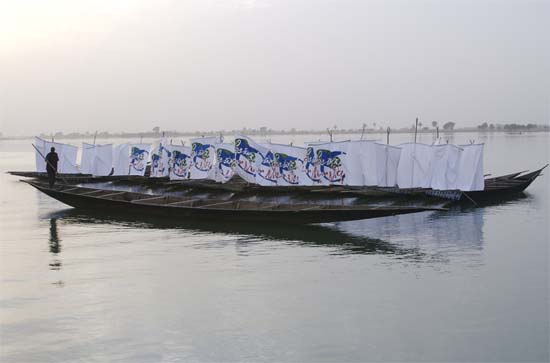
On the third day of the festival we watched the pirogue races, and I was touched that one of the entries (later disqualified on a technicality) was a Peace Corps boat, filled with American young people.
For the main event, boats full of Malians paddled ferociously from shore to a boat buoy and back, throwing up enough water that one of them actually sank. In a later race, staged just for fun, Peace Corps men and women joined Africans in their boats and thrashed their way to the finish near where we were sitting.
I caught the eye of one young American, resting on his oar; we gave each other a smiling thumbs-up.
Carol and I, enchanted by the beauty of the crowds around us, had earlier commented on how drab the white tourists - aging hippies, trekkers come in from the wilds - seemed when compared with their African counterparts. I do not exempt us, wearing old slacks and T-shirts, our shoes and faces coated with wind-borne dust.
But then we encountered the Peace Corps - a surge of American energy, idealism, beauty and youth.
Bowers, a graduate of Pitzer College, and Jessi Croizat, a UCLA grad whose family lives in Berkeley, spoke lovingly of their work in Guinea. Bowers had been assigned to an area that supported the beleaguered president, so she had not been in any danger; others in their group had had "frightening experiences," she said.
Both of them hoped to go back.
Talking to the girls over lunch, I couldn't help feeling emotional. I told them how difficult it had been as an American to see our country's reputation tarnished the world over - diminished by our government's go-it-alone attitude and ill-advised war in Iraq.
I told them how heartening it was to see Americans doing what they were doing - showing that most of our countrymen have kind hearts, high ideals and good intentions and are trying to do good in the world.
"Thank you," I said. "You've done a lot to restore my faith."
Then I left them, afraid I might burst into tears.
Beth Ashley can be reached at bashley@marinij.com.
